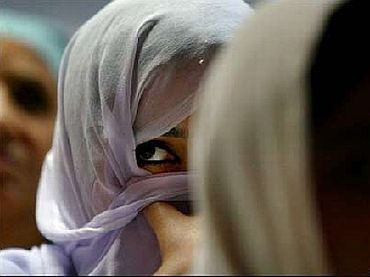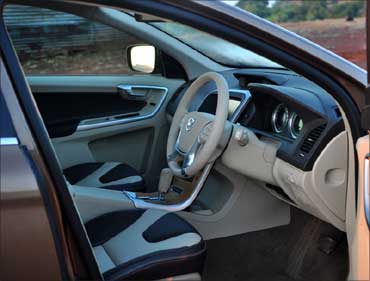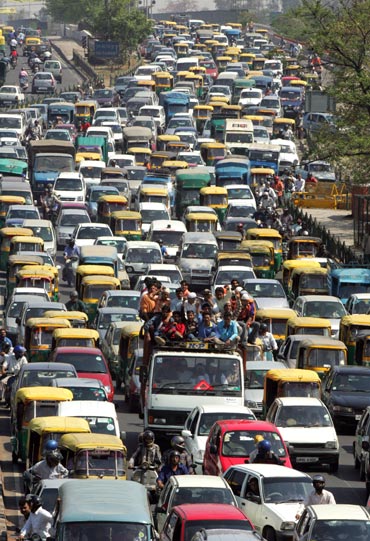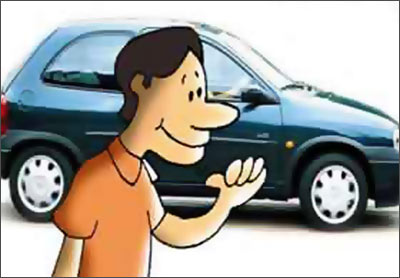 | « Back to article | Print this article |
Women and Delhi: Surviving in India's capital
So you're a single girl living in Delhi? Harnoor Channi-Tiwary tells you exactly what you need to do and remember while living and travelling in the capital city.
With over a quarter of the rape cases registered in the country taking place in New Delhi, it is fair to say that the capital is perhaps the most dangerous Indian city for women.
Even as women in Delhi are getting ready for the 'Slutwalk' -- a march to protest 'against the belief that any aspect of a woman's appearance might explain or excuse rape', Harnoor Channi Tiwary lists out dos and don'ts and the things you must remember while living and travelling in Delhi.
***
The capital city of Delhi has the reputation of being a historical and architectural marvel. Its infrastructure is the envy of all cities in India. But there is another side to the city, which earns it a bad name and that is its crime rate against women.
Recent figures released by the National Crime Records Bureau reveal that 1 in 4 rapes in Indian cities take place in Delhi.
The city also saw almost two fifths of kidnappings or abductions of women, 15 percent of dowry deaths and 14 percent of molestation cases.
Among large cities, Delhi, Bangalore and Mumbai accounted for 13.2 percent, 9.4 percent and 9.1 percent respectively of the total crimes -- over one-third of the total crimes reported from 35 mega cities.
Having said that, it is also true that Delhi has seen the number of cases of rape reported dip since a high of 658 in 2005 to 404 in 2010.
The causes for high crime rate can be attributed to many factors like the low police density for the high population of Delhi but these reasons do not help in mitigating them at a micro level.
The police and judiciary are there to help us but there is a lot that women can do to help protect themselves against harm.
Avoid public transport late at night
Every city, every culture has different nuances. If we understand those, it can help us adjust to the place better.
This does not mean that we should live in fear nor does it in any way insinuate that crime is perpetuated because of certain behaviour by women. But yes, there are some things one can do to remain safe.
Some cities like Pune or Ahmedabad are reputed to be safe at night. In Delhi, if one is going out at night, it is better to be careful. As far as possible, try to travel by your own vehicle and not public transport late at night.
Get someone you trust to accompany you
If it gets too late, get a friend to follow you home.
Pearl Kakkar, a PR professional working in Delhi sats, "Always have a companion if travelling late at night. Seeing someone else in the car acts as a deterrent to miscreants."
Never leave the door open for long
A study suggests that whenever you venture into the parking lot, have your car keys in your hand so that you don't stand around rummaging in your bag. Sit in the car and immediately lock the doors.
Don't wait to put on your seat belt etc with the doors open. If by any chance someone attacks you before you get in the car, throw your keys as far as possible (so that you can't be abducted) and shout loudly for help.
Stick to busy roads
If one must travel in public transport late at night, try to do so in a group. Try to stick to busy roads and not take routes, which may be shorter but go through dark alleys.
As an added precaution, Pearl advises "Keep a pepper spray or taser handy. Pepper sprays are available very cheap at any chemist."
Make sure your family knows where you are
Always tell someone in your family where you are going.
Though college days are for enjoyment and rebellion, always ensure that someone knows where you are.
Megha Manchanda, a 28-year-old working in a leading advertising firm in Delhi says, "Always have someone in your family or friends know where you are if you are out late in the evening. They should be able to reach or look out for you if something untoward were to happen".
Activate SOS SMS on your mobile
Megha Manchanda says, "These days there are softwares available for your phone that send out an SOS SMS to your near ones in case of an emergency. Being cautious is always a good thing! I am talking out of experience!"
Technology is also a great support system in today's world. India's high mobile penetration has ensured that almost all of us have a cell phone for our personal use.
Always keep your cell phone in a place where it can be easily retrieved from, like your pocket and make sure that your phone is charged. Also, have the number of your parents or someone trustworthy on speed dial.
Ensure your rickshaw driver knows that he is being tracked
If you feel like you're being followed or just have an uneasy feeling travelling alone in an auto, dial a friend and talk on the phone.
Make sure you loudly relay the auto or cab's licence number so that the driver is aware that he can be tracked.
Learn self defence
Learning self-defence techniques can also help mitigate many situations. If you have the time and resources, invest in any martial arts class like Karate, Krav Maga etc. If you don't, then learn some basic self-defence moves as to where to kick a person so that you may stun him and run.
The Delhi Police runs programmes to teach such techniques to young women periodically. These are advertised in newspapers, sign up for the next one.
Don't approach a vehicle asking for directions
If you're walking around even in broad daylight and a vehicle stops besides you to ask for directions or any other excuse, talk from a distance, do not approach the door of the vehicle.
You may be pulled inside," shares Satinder C, a 59-year-old mother of two girls and a Women's Rights Activist.
Don't drink with people you don't know
Also, avoid drinking alcohol if you are out with people you don't know well.
If you order anything, make sure that you take it straight from the bar or the waiter so that no one has an opportunity to spike your drink," Satinder C says.
Points to remember
It is true that we shouldn't live in constant fear. But if we are aware and cautious, we can ensure our safety and prevent any bad incident.
Tips like these can help women and young girls in any city, in India and abroad. All it demands is self-confidence and awareness of their surroundings. Here's a quick recap of pointers on how to keep safe in a big metro like Delhi:
- Avoid public transport at night.
- If driving at night, get someone you trust to follow you home in their vehicle or accompany you in yours.
- Have your car keys ready in your hand when you enter the parking lot. If attacked, throw your keys as far as possible and shout for help.
- Carry a pepper spray, deodorant or taser in your bag.
- Always tell someone in your family where you are going.
Feed in emergency numbers on speed dial or activate SOS SMS on your mobile phone. - Learn self defence
- Don't approach a vehicle asking for directions, talk from a distance.
- If travelling by auto or cab, call a friend or relative and loudly relay the license number to the person on the phone so that the driver is aware he may be tracked.
- Avoid alcohol when going out with people you don't know very well.










